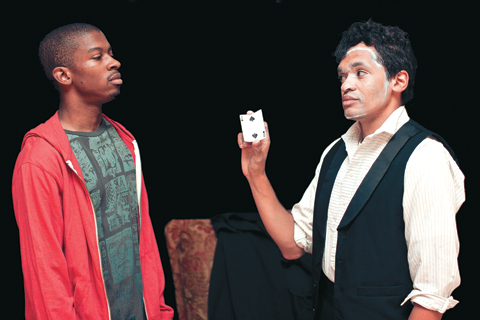
WHO HOLDS THE CARDS? Suzan-Lori Parks's tale of rivals. |
Their father meant nothing particularly serious when he named his sons, African-American like himself, Lincoln and Booth — in fact, Booth tells his little brother, the names were kind of a joke. But playwright Suzan-Lori Parks has a charged opposition in mind, in Topdog/Underdog, in which these brothers pose and play against each other, dueling for position in both their fraternal order and the success-story America that might as well be a foreign country to them. Bari Robinson, as Lincoln, and J.H. Smith III, as Booth, make volatile electricity of the brothers' warmth and their war, in the Dramatic Repertory Company's excellent production, under the direction of Keith Powell Beyland.
Since being thrown out by his wife, downtrodden Lincoln has lately been crashing at his younger brother's cold-water pad, in exchange for much of Lincoln's weekly earnings from the arcade, where the work involves, as Booth puts it, "dressing up like some crackerass white man, some dead president" — President Lincoln, in fact — " and letting people shoot at you." Previously, Lincoln had raked in cash as a gifted street impresario of the card hustle three-card monte, but swore off it after a partner was killed. Booth, meanwhile, rising against the fall of his older brother, has been fantasizing about and practicing Lincoln's old hustling patter, hoping to take it to the streets himself.
Smith and Robinson conjure a fraught and believably ambivalent fraternal rapport, and the difference in energy and outlook between their brothers is superbly dynamic. Booth buzzes with giddy, hopeful nerves, flashing a wide grin, bouncing on the cot; in a particularly delicious scene, he gleefully strips out of impressively numerous layers of boosted clothes. In contrast, Robinson's Lincoln slumps in boxers, his frock coat costume, and haphazard residuals of his occupational whiteface makeup, with slumped shoulders and tired eyes, his gaping jaw slack with skepticism, disdain, and futility.
But as Robinson's Lincoln gets drunker, his vacant mouth starts to hold the curl of a smirk, and the big brotherly confidence returns. In his boozy nostalgia for hustling, Lincoln's speech slips into a seductive, rhythmic cadence that sounds a lot like what we've heard of Booth's own attempts at the card con, but more so: We see both where Booth got it and why he would be at once so bemused, frustrated, and liberated by Lincoln losing it — and why Booth would falter uneasily as Lincoln starts to get it back. His big bro was a legend, and when Lincoln's drawn again to deal the cards (lit altar-white, in Michaela Wirth's beautiful design), Robinson's hands and voice are utterly bewitching.
Parks's contribution to the timeless brotherly-rivalry genre is arresting, and her conceit for addressing systemic American racism and poverty is brazen. "People like they historical shit in a certain way," Parks has Lincoln say of the clientele at work. "They like it to unfold the way they folded it up. Neatly like a book. Not raggedy and bloody and screaming."